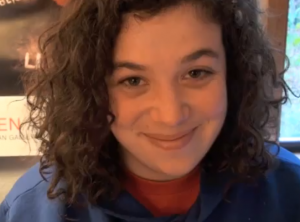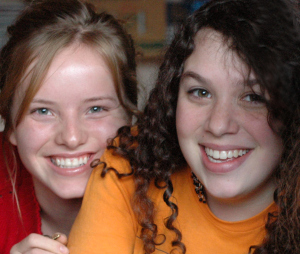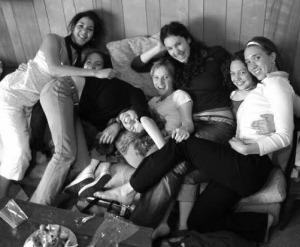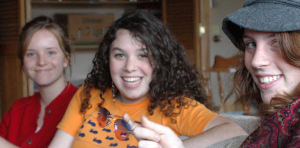Women Rising Radio is delighted to present an essay by US writer Lilly Schneider. Lilly endured the death of her mother when she was a teenager, and has been on a journey to heal from that life loss. What Lilly learned as a teen, and what she shares with us, can be a tool for all of us…. to heal and to come out of tragedy stronger than ever. She shares the work she did with Seattle’s TEEN TALKING CIRCLES GROUP, created and directed by Linda Wolf.
Lilly Schneider was raised in the Pacific Northwestern United States. A lifelong reader and writer, she studied English at Emerson College in Boston and graduated in 2011. Her writing has appeared or is forthcoming in Flash: The International Short-Short Story Magazine, McSweeney’s Internet Tendency, The Landing and elsewhere. She is certain that communication and story-telling are necessary tools for understanding of others, and of oneself. She participated in Teen Talking Circles for two full years in high school, and currently works for that organization.
Here’s Lilly’s story…
I was 16 when my mom died. A month later my friend Claire told me about Group and invited me. She told me who would be there. A girl I was afraid of, this bigmouthed theatre girl I’d heard my friends call a bitch. A girl I thought had weird eyes, I’d heard my friends call her a slut. A pixie blonde so pretty I couldn’t imagine we’d have anything to say to each other, me being so frizzy and fidgety and fat and all. All older. A younger girl I’d seen in a long tapestry coat in the hallway, and who did she think she was anyway, looking all cool like that? I had fear, jealousy, hate in the hallways for all of them. I thought of myself as a nice person back then, too.
It was a period of extreme stress for me. I kept bashing up against the wall that said my mom was never coming back and I kept looking for a way around that wall like a stupid little fly against a window. I focused much of my stress into planning my college applications, which was the most important thing in the world. My classmates, many of whom I had known—Claire included—since childhood, I now found ridiculous because they hadn’t gone through what I was going through. I had no real respect for anyone my age, suddenly zero patience for the chattering, crush-crazy girls who had been my sleepover set and who had saved me in middle school when I had had no friends; I respected adults, who had sometimes already lost their parents, and who seemed always to have wise things to say. I had barely any fingernails left from gnawing, and the skin around them was tattered and dead. My house was cold always and my father, brother and I, though friends, were all alone, islanded, castaways in the storm of grief, even as we sat over dinner together. Dinner was brought every night that year by people from the community, and dessert too, usually brownies. I’d eat a whole paper plate of them in one standing at the kitchen counter. The families who knew us made our favorite things, dishes we’d all enjoyed together, pesto, salmon, and kid stuff—pasta and chicken nuggets and meatloaf. Families I’d never met before gave us walnutty casseroles and strange vinegary salads. Love was coming to us in food form. Automatically, we swallowed. But the food arrived in the afternoons, was sitting on our cold woodstove when I got home from school, or was delivered quickly by bosomy ladies I didn’t know (they’d explain we’d met when I was five or something) and who hugged me desperately and seemed to want to drop the food and get out of there, back to their own happy homes. I hated that they could just waltz home to their own families. They had an escape from the bad place. They only came to peek in the doorway, and they didn’t bash into the wall all the time, the wall that made school, home and everywhere in between almost intolerable—most waking life intolerable. People said I was strong, but I simply went through the motions of living because the alternative, as I pictured it, was lying facedown in a mud puddle all day.
I remember the first thing that I said in Group: well, hi, my name is Lilly and uh I’m 16, I’m 16 and I’m on the newspaper with Claire and I like reading, writing, collecting big earrings at thrift stores, and uh my mom died so yeah. When? Oh, last month. Everyone gasped at that. I remember peering out sort of vaguely at their clear shock and horror being totally unable to relate to it. It was as if I’d been slowly turning purple over the eight years my mom was sick and now that I was doomed to be purple permanently I was faced with some people who didn’t even know people came in purple at all. How could they not realize I was purple? They were green, that’s why. Everyone my age was ignorant and green, and also skinnier than me.
The part of Group that changed my life wasn’t the part where I talked. I’ve always been good at talking, communicating, finding people to listen, making people laugh. That year I saw a therapist, who mostly listened to me babble hyperspeed about college deadlines, and I had tea and coffee with my mother’s friends, who made sure to be there for me. The part that changed everything, quickly, for me, was listening to these girls talk.
They had feelings and they had fears. They were scared of other girls too. One who I thought was mean didn’t know anyone was afraid of her. One who I thought was boring was not. One who I thought was obnoxious was hilarious. One who I thought was snotty was down to earth. One who I thought was stupid was sensitive. Claire who I thought was always in one mood was often in a different mood. And everyone was worried about their bodies, and no one would break the circle. It was as simple as that. We had agreed to create a safe space together, and so we did—us, just girls who didn’t even know each other before. As an adult nurtured by Group I am able to create these spaces temporarily but at the time I literally did not believe such an environment was possible. It was absurd to me, and miraculous. I learned every person was a person just like me. Now it seems obvious, but not then: then, this was a revolution. Circle asked for active compassionate listening, and I learned to give it. I had never had the opportunity to practice it before. High school was no place for it—or was it?
The equality I learned about in Group began to seep into the whole canvas of high school I’d painted for myself. I realized that if I had been so wrong about all these girls, I was probably wrong about everyone. Everyone I saw in school must also have feelings and fears and their own story, their own humanness. During a time when no one demanded anything of poor motherless me, a time when I was spoiled with pity and blessed with whole casserole dishes of compassion, I began to work on respecting other people, a lifelong project. Deep respect for others is essential for peace—world peace, and also personal peace. I’d wasted enough energy fearing, hating, manipulating and being manipulated. There was another way to be. Kind.
Living with active compassion, it turned out, was such a better way to live. Writing people off cuts their connections to you; respecting them opens the channels. This has been one of the greatest gifts of my life: the gift of other people. I think in high school many people squint out at a crowd which holds only a few desirable or possible companions. For some, most unfortunately, this continues into adulthood. We draw lines to protect or maybe even just amuse ourselves, lines that do not really exist, and then we are unable to cross those lines, and then we suffer from loneliness, from staleness, from pettiness, from not enough pokes in the ribs and rolls in the hay and dances with the devil who’s not no devil really. I’d drawn lines, surface-level ones tied to appearance, reputation, popularity, GPA. The big line I drew was losing my mom, and group smudged it.
Body image was also a big thing. The girls in group suffered insecurity over their noses, thighs, bellies, butts, breasts—so needlessly, it seemed to me, when they were so gorgeous. Over time I began to realize the needlessness of my own suffering, misery that made me so sick with myself some nights that I couldn’t sleep and lay burning in the darkness with a desperate furious wish to wake up twenty pounds lighter. With the beauty of my Circle goddesses in mind I made daily choices to love and respect my body, to feed it healthfully and appreciate the way it let me breathe, express myself and play. I began to see myself as beautiful. I began to allow myself to let boys see me that way too.
Linda and I ran into each other at a burrito place when I was 19 or 20, and she grabbed my hands and inspected them. “You have nails!” she said. “Cuticles! Tips!” When she knew me, I hadn’t had any of that. I’d been biting into my own skin, hurting myself. I’m 24 now, and my nails are long and strong. My guiding belief, which I’ve come to suspect I share with my mother, is that everyone is as much a person as anyone else, and deserving of equal love and respect. It is my greatest satisfaction to give that love and respect to anyone, everyone, and feel it spinning back to me in endless reams of light. I delight in crossing those lines we draw, in showing other people that it’s possible, even pleasurable, and important; I am attuned to responding to others who can help me cross the lines I draw and I focus on erasing those lines so that, as often in daily life as possible, I can stay on the level we all lived on in Circle.





